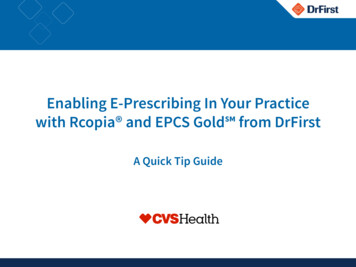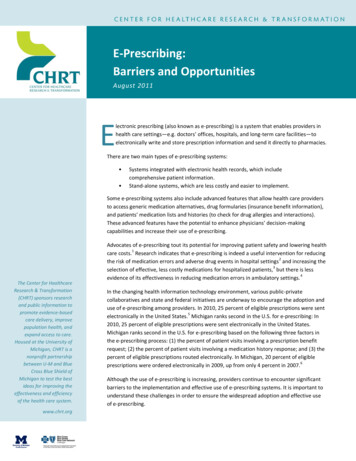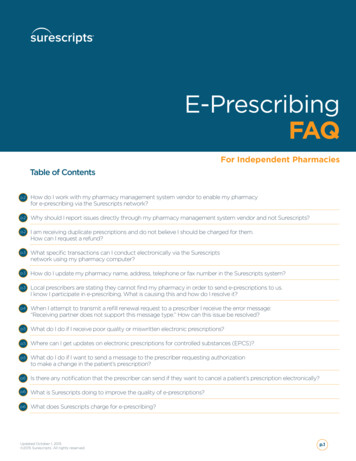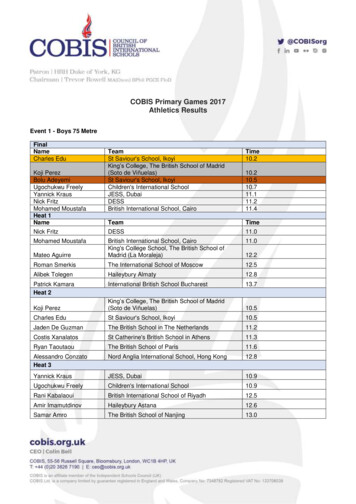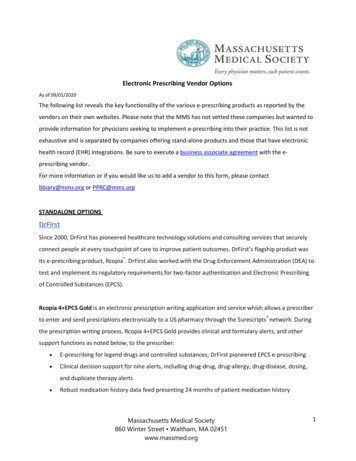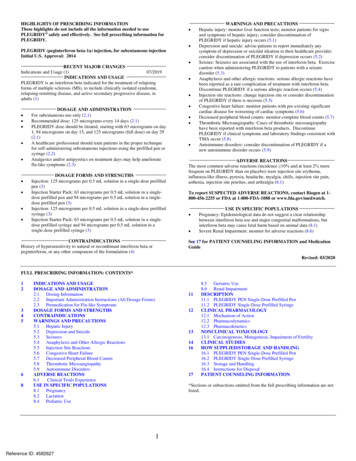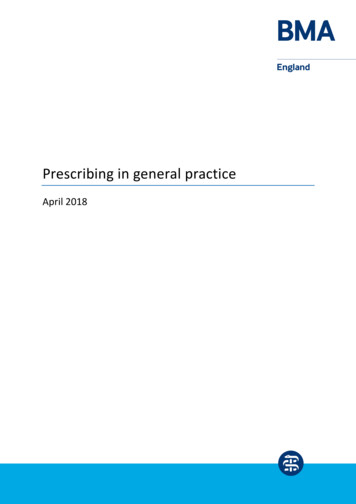
Transcription
Prescribing in general practiceApril 2018
INTRODUCTIONThis guidance was put together by the Clinical and Prescribing subcommittee to meet the increasingdemand from individuals and organisations for information relating to prescribing in general practice.Doctors have specific clinical rights and responsibilities in relation to prescribing, and as most generalpractitioners work within the NHS, they are also bound by the NHS regulatory system.The first section sets out the BMA policy on some common issues. The rest of the guidance is set outin a series of questions and answers for ease of use. The earlier sections of the FAQs are likely to beof most interest to doctors, Primary Care Organisations (PCOs; including CCGs in England) and otherNHS organisations, whereas the later part deals with general issues around prescribing that may beof particular interest when dealing with queries from patients.GPC POLICYDrug switchingThe GPC is aware that in some areas practices are being encouraged by their PCO to switch patientsfrom one drug to a less expensive drug. The prescriber must assess each patient individually whentaking the decision to change a patient’s medication. Any changes must be made in the patient’s bestinterests and must be fully explained to the patient.Where a bulk switch is made at the request of the PCO or CCG they should provide adequateresources to facilitate the switch including the input of the pharmacy advisor and resources to informpatients of the change. Where it is reasonable to switch a patient then practices may agree to do so.However, GPs must always use their clinical judgement and, where they can make a clinical case fornot switching a patient, they have every right to continue to prescribe as they feel is clinicallyappropriate. GPs continue to carry responsibility for their prescribing decisions.Repeated switching on the basis on cost savings alone can irritate patients and can erode trust andcompliance. These detrimental effects need to be borne in mind.A related issue is the confusion patients can experience when the colour and shape of their tablets arechanged as a result of pharmacists changing supplier. With some pharmacists this can happenfrequently. Continuity in prescribing for individual patients is safer and will improve compliance.Exemptions from prescription chargesPeople with certain medical conditions can get free NHS prescriptions, and in April 2009 cancer wasadded to the list of conditions that give exemption from prescription charges. Patients receive anapplication form which needs to be countersigned by their GP or hospital doctor (or, at their GP'sdiscretion, a member of the practice who can access their medical records). The full list of exemptedconditions is available on the NHS Business Services Authority website, including further guidance.The BMA has long called for a review of the prescription charge system and believes that prescriptionsshould be free of charge for all patients in England as they already are in the rest of the UK.Page 2 of 11
Excessive prescribingThe GPC is aware that some PCOs have in the past attempted to misuse Annex 8 of the 2006/07 GMScontract (‘Excessive and inappropriate prescribing: guidance for health professional on prescribingNHS medicines’) to control prescribing or threaten termination of GMS contracts. The GPC hasproduced further guidance ‘Focus on excessive prescribing’ which is available at the following link.Medicines shortagesIn 2011, the GPC produced joint guidance with the Department of Health, PharmaceuticalRepresentatives and MHRA via a Medicines Supply Chain group, Best practice for ensuring theefficient supply and distribution of medicines to patients, that sets out the key legal and ethicalobligations on manufacturers, wholesalers, NHS Trusts, pharmacies and dispensing doctors inrelation to the supply and trading of medicines. However, this remains a problem for both patientsand doctors, and the GPC continues to be in discussion with England’s Department of Health.Non-GP prescribingWhen a non-GP prescriber initiates a new drug, they accept responsibility for that prescription, butusually have no method of reissuing repeats and so that responsibility invariably falls on GPs. Whenfaced with a request from the patient for a repeat prescription initiated from outside the practice,GPs should review the patient and set up a repeat prescription if appropriate or refer the patientback to initial prescriber.Good working practice would advise that anything prescribed for long term prescription should benotified to those likely to continue the medication (i.e. the GP). The responsibility for checkinginteractions remains with the prescriber who should take a full drug history if they do not haveaccess to the main clinical record. [See also FAQs on supplementary and independent prescribers]Prescribing numbers for GPsFollowing pressure from the GPC, from 2007 salaried GPs have been entitled to have their ownprescribing number. When a salaried GP joins a new practice, they would need to fill in an NPL 2/3form [change to circumstance or status]1 and send to their local NHS England Team, to obtain anindividual unique prescribing number. We continue to make representations for all prescribers tohave a unique identifier for their prescribing consisting of an individual number combined with alocation code.Prescribing incentive schemesPrescribing incentive schemes are implemented in some areas to reward practices for cost effectiveprescribing. GPs should be aware of the costs involved and ensure ethical consideration when signingup to schemes. The GPC supports prescribing incentive schemes where they are evidence-based andintroduced with the support of local GPs. For further advice see the GMC guidance Good MedicalPractice about good clinical care and Good practice in prescribing and managing medicines procedures/Page 3 of 11
Prescribing adviceSome practices and GPs may wish to use prescribing decision support software, which provide GPswith national and locally authored patient safety information messages, drug switchrecommendations and other prescribing information. Practices do not have to use this software ifthey choose not to and PCOs / CCGs should not place undue pressure on them to install thissoftware. GPs must not rely on such recommendations and must always ensure that their prescribingdecisions are in the patient’s best interests.Working with pharmacistsThe GPC is working together with the Pharmaceutical Services Negotiating Committee (PSNC), onissues relating to community pharmacists. Guidance on community pharmacy is available on thewebpage for dispensing doctors and community pharmacy.Community Drug ChartsThere is no need for a GP to complete a community drug chart (MAR Chart) as a prescription is allthat is legally required for a nurse or other community worker to administer medication.We believe that there is widespread confusion about the role of a medicines administrationrecord. Many people believe that this is an instruction for the medication to be administered,whereas it ought to be regarded as a record that a medication has been given, with theinstruction being provided by the information provided by the prescriber on the prescription andrecorded by the dispenser on the original packet. We do have concerns that many organisationsthat use MAR charts use them inappropriately as an authority to administer, rather than as arecord of that administration.If the employer of the community nurse (or other worker) requires any additional documentationthen the responsibility for completing that resides with the organisation whose staff are using it,compiled from the information provided by the prescriber, and completed by staff trained in theprocess. The drugs themselves should be given according to the prescription as recoded on theoriginal packet, with only the fact that it was given (or not) entered on the MAR chart.Page 4 of 11
Questions and Answers on prescribing issuesPRESCRIPTION INTERVALSIs there a standard prescription interval?Doctors should provide prescriptions for intervals that they feel are clinically appropriate, taking intoaccount such factors as possible reactions, the stability of the treatment, patient compliance, andany necessary monitoring. Sometimes a doctor may give six or even twelve months supply on oneprescription (for example the contraceptive pill, or thyroxine, with a regular review in surgery oncethe patient is safely stabilised) as this is cost-effective and convenient for patients. A report2 onprescribing durations recognises that blanket instructions to only give 28 days’ supply are associatedwith significant increases in dispensing and other transaction costs, together with reductions incompliance in previously stable patients, and an increase in dissatisfaction amongst patients becauseof travel costs and time to obtain regular medicines. It can also place significant and unnecessaryworkload on the doctor and surgery staff.What should we do about seven-day prescribing for MCA dispensing?The request for seven-day repeat prescriptions to defray the pharmacist’s costs for the filling ofMCAs has become an increasing pressure for GPs. Our advice is to resist such demands unless thereis a clinical reason for restricting supply to seven days. Length of prescriptions should be specific tothe status and condition of the patient and their particular clinical needs. Consistency of size, shapeand colour of the medication could be more effective than using MCAs, as it can be confusing forpatients to receive medication that appears different every time that it is prescribed. There are alsosome storage problems involved in using MCAs, such as possible deterioration of drugs after beingtaken out of the packet.There are also alternative ways to support patients taking medication, such as medicine advicecharts, which allow the drugs to then be retained in their original packaging with advice sheets.The GPC supports the Pharmaceutical Services Negotiating Committee (PSNC) in that bothpharmacists and dispensing doctors issuing MCAs should be properly reimbursed for the servicesthey provide to patients.TRAVEL VACCINATIONSGuidance on travel vaccinations can be found in our Focus on travel immunisations.2Individualisation or standardisation: trends in National Health Service prescription durations in England ge 5 of 11
SUPPLEMENTARY AND INDEPENDENT PRESCRIBINGWhat is a supplementary prescriber?Supplementary prescribing involves a voluntary partnership between an independent prescriber anda supplementary prescriber (a trained nurse, midwife, pharmacist, physiotherapist, diagnostic andtherapeutic radiographer, or optometrist who has completed the relevant training programme) toimplement an agreed patient-specific Clinical Management Plan with the patient’s agreement.However, this arrangement is becoming less common, with the broadening of the group ofprofessionals that can be independent prescribers (see below).What is an independent prescriber?Currently independent prescribers include nurses, pharmacists and optometrists; and chiropodists,physiotherapists and podiatrists who were added to the list of independent prescribers in 2013.Nurse independent prescribers include district nurses and health visitors who can prescribe in theirown right. Independent nurse prescribers can prescribe any medicine for any medical conditionwithin their competence, including some controlled drugs listed in schedules 2-5 exceptdiamorphine, cocaine, dipipanone for the treatment of addiction.Qualified and registered pharmacist independent prescribers can prescribe any medicine for anymedical condition within their competence, including any controlled drugs listed in schedules 2-5except diamorphine, cocaine, dipipanone for the treatment of addictionError! Bookmark not defined.Optometrist independent prescribers can prescribe any licensed medicine for ocular conditionsaffecting the eye and surrounding tissue, but cannot prescribe any controlled drug independently.Although all independent prescribers have access to the full range of medicines listed in the BNF,they have an overriding professional duty to prescribe within their knowledge and competency.The PSNC has a useful list of which different prescribers can prescribe, available here.Does this mean that doctors bear no responsibility for independent prescribers?Independent prescribers are professionally responsible for their own actions. However, where anurse is appropriately trained and qualified as an independent prescriber and prescribes as part ofhis or her nursing duties with the consent of their employer, the employer may also be heldvicariously responsible for the nurse's actions. All independent prescribers should ensure they haveprofessional indemnity and the employing GP should be satisfied that any employee has the relevantskills and training.Have prescribing by podiatrists, chiropodists and physiotherapists now been introduced?The BMA believes that appropriately trained physiotherapists, chiropodists and podiatrists should bepermitted to prescribe independently from a list of specified medicines for a specified list ofconditions, as is the case for dentists, unless under supervision of a named consultant. As of 2013,podiatrists, chiropodists and physiotherapists have been added to the list of independentprescribers, and the Health and Care Professions Council will be their regulator.Page 6 of 11
PRIVATE PRESCRIPTIONSIf a patient has been seen privately in secondary care and is given a private prescription, isit acceptable for them to come to their GP and ask for it to be converted to an FP10?If a patient is being seen as an NHS patient in a private facility (e.g. through eRS), they should beprovided with NHS prescriptions by the clinician responsible for their care.If a GP receives a letter from a private consultation advising/suggesting a course of action then it maybe appropriate for a script to be issued on an FP10 if the GP agrees with the advice. The prescribertakes clinical responsibility for monitoring, so the GP must ensure that they are able to accept thisresponsibility.If the drug is one that a GP would not normally initiate, then it may be prudent to await a fullcommunication from the private consultant. Even then, replacement of the private prescription withan FP10 may not be appropriate and the patient may need to be advised of this.Can I prescribe drugs which are available on the NHS and are cheaper than the prescriptioncharge, e.g. amoxicillin, on a private script to save the patient money?GPC has obtained legal advice that in case of treatment under the primary care contract, GPs maynot issue private prescriptions alongside as an alternative to FP10s. In any case where a GP is obligedto issue an FP10, the concurrent issue of a private prescription will be a breach of this obligation.Are CCGs allowed to request that GPs issue private prescriptions of branded medicineswhere a patient has requested a brand but there is no clinical reason why the genericshould not be prescribed?GPC has obtained legal advice which confirms that GPs cannot issue private prescriptions alongsideNHS prescription forms (FP10s), including in the context of locally commissioned services outside thecore GMS/PMS contract, as this would be a breach of the GMS Contract Regulations.Clause 14.2.2. of the GMS contract state that, subject to specific exceptions, a prescriber “shall orderany drugs, medicines or appliances which are needed for the treatment of any patient who isreceiving treatment under the contract by issuing to that patient a non-electronic prescription form”.The medicine must be ordered on an FP10, and to supply it via a private prescription would be abreach both of the requirements of the Regulations and the terms of the contract.CHARGING PATIENTSMay GPs charge their own patients?The GMS contract prevents contractors from charging their patients for most services. There arehowever instances were charges may be made. Schedule 5 of GMS Regulations 2004 lists the strictlylimited circumstances in which GPs may charge fees for providing treatment to their NHS patients.Similar arrangements apply to the other contractual options.Page 7 of 11
May GPs charge for issuing a private prescription?GPs may write private prescriptions for patients which they may wish to do for drugs not availablethrough the Drug Tariff. However, GPs may not normally charge their registered patients forproviding such a prescription, although a dispensing doctor may charge for dispensing theprescription. The only occasions when a doctor may charge for a private prescription are:1. For drugs which are being issued solely in anticipation of the onset of an ailment whilst outsidethe UK, but for which the patient does not require treatment when the medicine is prescribed.2. For drugs issued for the prevention of malaria.May GPs charge for dispensing a private prescription for ‘black/grey listed’ drugs?Prescribing doctors may not charge. Dispensing doctors can supply ‘black/grey’ listed drugs andcharge for the supply of the drug as set out in schedule 5, section 24 of the GMS Regulations 2004.PATIENTS AND PRESCRIBING: RIGHTS AND RESPONSIBILITIESAm I right, that as an NHS patient my GP must prescribe for me whatever I want?Under the NHS regulations your GP must prescribe for you any drugs that he or she feels are neededfor your medical care. A patient is entitled to drugs that the GP believes are necessary, not thosewhich the patient feels should be prescribed. GPs are responsible for all prescribing decisions theymake and for any consequent monitoring that is needed as a result of the prescription given.The Department of Health lists all drugs that the NHS is prepared to pay for in a list called the DrugTariff. It is likely that most, if not all, the drugs you need are available through the NHS, however theDrug Tariff does have exceptions. Some drugs, listed in Schedule 11 will only be offered on the NHSto patients suffering from specified conditions. Similarly, some products other than drugs, such asgluten free foods or sunblocks, are listed as ‘Borderline Substances’ and may only be prescribed atNHS expense in defined circumstances. Other drugs or substances, listed in Schedule 10, cannot beprescribed at all on the NHS, these include Evening Primrose Oil, many vitamins, bath preparations,cough syrups and expensive brand names of some drugs.If a drug is not available on the NHS, can my GP write me a private prescription for it?Any doctor can write a private prescription for a patient if they feel it is clinically appropriate andthey are happy to take responsibility for that prescribing decision. Under the NHS regulations, a GPor his deputy can write a private prescription for a patient but cannot charge the patient for writing aprivate prescription if the patient is registered for NHS care with that GP or any other GP in the samepractice.The only exceptions to this rule are when an NHS GP writes either a private prescription for:1. Drugs which are being issued solely in anticipation of the onset of an ailment whilst outsidethe UK, but for which the patient does not require treatment when the medicine is prescribed.2. Drugs issued for the prevention of malaria.Page 8 of 11
Can my GP supply me with drugs directly rather than going to a pharmacist?The supply of drugs in the NHS is highly regulated. NHS prescriptions must be dispensed atpharmacies except where a doctor has been granted permission to be a dispensing doctor. This ismost likely to happen when there are few, if any, pharmacies in a rural or semi-rural area. The area isthen known as a ‘Controlled Area’ and a dispensing doctor is allowed to supply drugs to namedpatients who live more than one mile from a pharmacy. Many dispensing doctors can only dispenseto some of their patients depending on the position of a pharmacy. All patients have the right totake their prescription to a pharmacy of their choice if they wish to do so.Malaria chemoprophylaxis - The Department of Health has issued guidance that medication formalaria prophylaxis may not be reimbursed under the NHS and so this should be prescribedprivately. A GP may make a charge for the provision of prescriptions for malaria tablets if these arenot available ‘over the counter’ at a pharmacy.A GP, even a dispensing GP, is not allowed to sell any ‘over the counter’ medicines.Can my GP refuse to give me a prescription that my consultant asked them to provide?Yes, your GP may refuse because the person who signs the prescription is legally liable for theprescribing and the consequent effects of that drug. Some drugs which may be very familiar toconsultants in a specialised area of medicine can be potent drugs of which a GP will have littleexperience (for example many cancer drugs or specialised treatment for diseases such as rheumatoidarthritis – the group called ‘biologicals’). Where a GP considers that it is inappropriate for them toissue a prescription on the advice of a third party, responsibility for provision will rest with the doctormaking the recommendation.As part of the 2017-18 NHS standard contract for secondary care trusts, new requirements on hospitalshas been placed to reduce inappropriate bureaucratic workload shift onto GP practices. As a result,the GPC has published template letters in the event that hospitals are not implementing the changes,as well as template letters to CCGs to highlight where there has been a breach of the standard contract,for the CCG to take action. These letters are available here.A friend’s GP wrote them a similar prescription on a consultant’s advice, why won’t mine? Ithink this is discriminatory.Each GP will make prescribing decisions based on what they are or are not prepared to take clinicalresponsibility for. Some doctors might have special training or knowledge of a particular area ofmedicine which makes them comfortable to prescribe and monitor a drug where many GPs would not.Clearly, a GP should be aware of their limitations as well as their skills and must ensure that they arenot prescribing beyond their knowledge or their ability to ensure patient safety. GPs are not obligedto provide every possible medical service to their patients, only those for which they have beencontracted for, and these contracting arrangements may vary between practices.Page 9 of 11
What is a shared care agreement?Sometimes the care of a patient is shared between the two doctors, usually a GP and a specialist. Thereshould be a formalised written agreement/protocol setting out the position of each, to which bothparties have willingly agreed, which is known as an ‘shared care agreement’.It is important that patients are involved in decisions to share care and are clear about whatarrangements are in place to ensure safe prescribing. In some cases, a GP may decline to participatein a shared care agreement if he or she considers it to be inappropriate. In such circumstances theconsultant would take full responsibility for prescribing and any necessary monitoring. Guidancecovering these issues (Responsibility for prescribing between primary and secondary/tertiary care)was published in 2018 on the NHS England website.I live abroad for six months of the year and my GP has refused to give me a prescription.The NHS accepts responsibility for supplying ongoing medication for temporary periods abroad of upto three months. If a person is going to be abroad for more than three months then only a sufficientsupply of his/her regular medication should be provided to enable them to get to the destination andfind an alternative supply. NHS prescriptions must never be obtained by relatives or friends on behalfof patients who are currently abroad, irrespective of such factors as owning a house in the UK or payingUK taxes. Patients are responsible for ensuring that any drugs they take into a country conform to locallaws.Page 10 of 11
USEFUL RESOURCESBMA guidance on drugs and ctices/service-provision/prescribingGeneral Medical Council (GMC) - Good practice in prescribing and managing medicines and deviceswww.gmc-uk.org/guidance/ethical guidance/14316.aspNHS England - Responsibility for prescribing between primary and secondary/tertiary ary-care/NHS Prescription ServicesFor the monitoring, processing and information feedback related to NHS prescribing.www.nhsbsa.nhs.uk/prescriptionsThe Medicines and Healthcare Products Regulatory AuthorityRelating to drug licensing, yellow card reporting, drug and device safety and medicine consultations.www.mhra.gov.ukThe Royal Pharmaceutical Society of Great BritainGuidance on controlled drugs and the Misuse of Drugs Act, and on medicines use and storage.www.rpharms.comThe Dispensing Doctors AssociationGuidance for dispensing doctors, including legal requirements for storage of controlled drugs.www.dispensingdoctor.orgNHS (General Medical Services Contracts) (Prescription of Drugs etc.) Regulations 2004www.opsi.gov.uk/si/si2004/20040629.htmBritish National Formulary (BNF)www.bnf.orgThe Human Medicines Regulations /madeElectronic Prescription Service n-ServiceNICE Medicine and prescribing supportwww.nice.org.uk/mpcPage 11 of 11
demand from individuals and organisations for information relating to prescribing in general practice. Doctors have specific clinical rights and responsibilities in relation to prescribing, and as most general practitioners work within the NHS, they are also bound by the NHS regulatory system. The first section sets out the BMA policy on some common issues. The rest of the guidance is set out .
